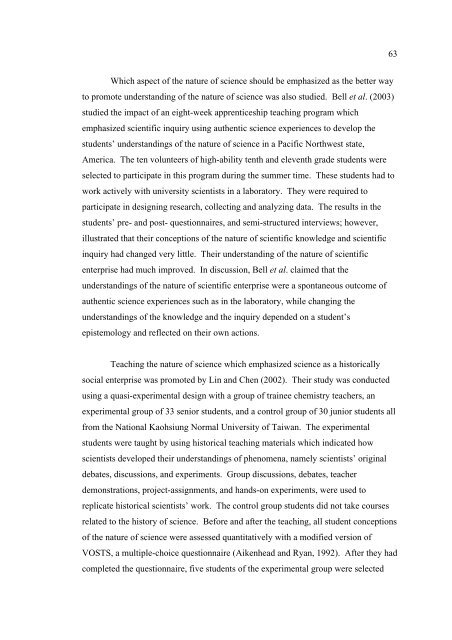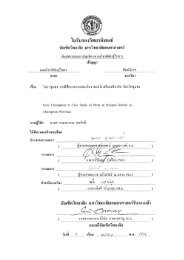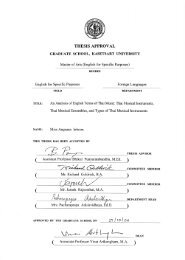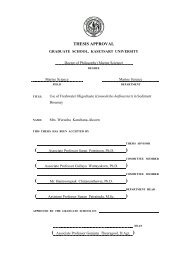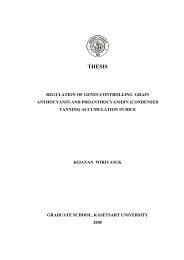an innovative approach
an innovative approach
an innovative approach
You also want an ePaper? Increase the reach of your titles
YUMPU automatically turns print PDFs into web optimized ePapers that Google loves.
Which aspect of the nature of science should be emphasized as the better way<br />
to promote underst<strong>an</strong>ding of the nature of science was also studied. Bell et al. (2003)<br />
studied the impact of <strong>an</strong> eight-week apprenticeship teaching program which<br />
emphasized scientific inquiry using authentic science experiences to develop the<br />
students’ underst<strong>an</strong>dings of the nature of science in a Pacific Northwest state,<br />
America. The ten volunteers of high-ability tenth <strong>an</strong>d eleventh grade students were<br />
selected to participate in this program during the summer time. These students had to<br />
work actively with university scientists in a laboratory. They were required to<br />
participate in designing research, collecting <strong>an</strong>d <strong>an</strong>alyzing data. The results in the<br />
students’ pre- <strong>an</strong>d post- questionnaires, <strong>an</strong>d semi-structured interviews; however,<br />
illustrated that their conceptions of the nature of scientific knowledge <strong>an</strong>d scientific<br />
inquiry had ch<strong>an</strong>ged very little. Their underst<strong>an</strong>ding of the nature of scientific<br />
enterprise had much improved. In discussion, Bell et al. claimed that the<br />
underst<strong>an</strong>dings of the nature of scientific enterprise were a spont<strong>an</strong>eous outcome of<br />
authentic science experiences such as in the laboratory, while ch<strong>an</strong>ging the<br />
underst<strong>an</strong>dings of the knowledge <strong>an</strong>d the inquiry depended on a student’s<br />
epistemology <strong>an</strong>d reflected on their own actions.<br />
Teaching the nature of science which emphasized science as a historically<br />
social enterprise was promoted by Lin <strong>an</strong>d Chen (2002). Their study was conducted<br />
using a quasi-experimental design with a group of trainee chemistry teachers, <strong>an</strong><br />
experimental group of 33 senior students, <strong>an</strong>d a control group of 30 junior students all<br />
from the National Kaohsiung Normal University of Taiw<strong>an</strong>. The experimental<br />
students were taught by using historical teaching materials which indicated how<br />
scientists developed their underst<strong>an</strong>dings of phenomena, namely scientists’ original<br />
debates, discussions, <strong>an</strong>d experiments. Group discussions, debates, teacher<br />
demonstrations, project-assignments, <strong>an</strong>d h<strong>an</strong>ds-on experiments, were used to<br />
replicate historical scientists’ work. The control group students did not take courses<br />
related to the history of science. Before <strong>an</strong>d after the teaching, all student conceptions<br />
of the nature of science were assessed qu<strong>an</strong>titatively with a modified version of<br />
VOSTS, a multiple-choice questionnaire (Aikenhead <strong>an</strong>d Ry<strong>an</strong>, 1992). After they had<br />
completed the questionnaire, five students of the experimental group were selected<br />
63


